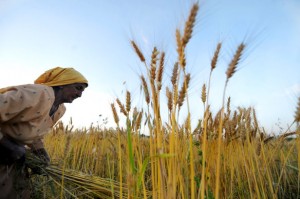Poverty and Property Rights in Pakistan
Monday, February 20th, 2012 9:02:52 by Fayyaz Yaseen
Poverty and Property Rights in Pakistan
Policy debates aimed at alleviating poverty usually emphasize on the monetary aspects of the issue. They tend to overlook the fact that factors like access to and ownership of the natural resources and land has also got a crucial
role to play in this regard. They usually disregard the historical evidence that whenever poor people and natural resources had been misused or abused, it was due to the absence of the clear property rights.
Perhaps that is the reason that while reports generated by some of the top institutions working on poverty alleviation and sustainable development in Pakistan have been insisting upon the rights of the poor, including the human
rights, environmental, legal, political, women’s or collective rights, there is none who would take into account the importance of the property rights.
Matter of fact, there are no two opinions on the point that property or land is one of the most critical assets, particularly for the poor dwelling in the rural settlements as it ensures a means of livelihood for them through the
cultivation and sale of crops and other products. For the poor, regardless of living in urban or rural areas, property rights ensure housing, self respect and a significant means of accumulation.
However, without having a clear title to their houses, farms, stores or so forth, the poor cannot sell their assets or use them as collateral for credit to invest into the land. Moreover, since most of the times such assets are
subject to seizure at the whim of the revenue department, assertion of ownership by the government or the rich and the powerful land mafia, the poor always remain reluctant to invest in improving them. Besides other virtues of the property rights, studies
in the South Asia have proved them as important determinants to food entitlement, amid which, they are the most essential means of perpetuating or breaking transmission of the poverty.
In context of gender differentiation, importance of property rights tends to increase further. Developing countries (Pakistan in particular) are comprised of the social structures where women’s property rights are limited by social
norms and customs which not only hamper their economic status and opportunities to overcome the poverty, but also entitles them to a lower social status. Ownership of land and property empowers women and provides income security. Without the right to property
or land entitlement, women have limited say in household decision making, and no recourse to the assets during crises, which usually culminate in rendering them vulnerable to the domestic violence.
While digging deeper into the phenomenon of prevailing deprivation of the rights to property entitlement among women, though no solid study has yet been conducted in this regard, one discovers the reasons like prevalence of system
of patriarchy, which invariably exclude women from ownership of land, indigenous customs and practices, statutory laws which re-affirm those systems, customs and practices especially in relation to the right to inherit property, and land governance system
behind the phenomenon.
When it is about giving women the right to have a share in the family property, the otherwise quite religious society of ours prefers to follow the cultural norms that are totally opposite to the teachings of Islam. To deprive
them of the family inheritance, either they are killed or married to Quran.
Realizing the importance of land or property rights and their role in alleviating poverty and abolishing the heinous crimes of Swara and Vani (honour killing) in Pakistan, it is high time development and research organizations
had planned and initiated thorough studies into the issue and conducted brief programmes to spread awareness and empower women to demand their right to own land.
Given the multiple hindrances for women to claim their right to own property, and consequently to do business or live a financially independent life, the development organizations, research institutes along with civil society will
have to simultaneously work on many fronts. The irony is that unlike Vani and Swara, deprivation of women from property rights is not considered a crime in our society. Thus, they will have to start from sensitizing the society first, and later on, will have
to struggle for proper implementation of the relevant legislation.
For sensitization of the society, case studies about how deprivation of the property rights can ruin women’s life and how the opposite can empower and positively affect and improve the quality of their lives should be brought forth.
This dissemination of knowledge will gradually enable the stakeholders, particularly women, to identify impediments to secure access, effective control and sustainable stewardship of land and to remove them accordingly.
Moreover, such work will also trigger research on key questions encompassing the areas like culture, law and norms and practices and their role in hindering the way of women from assuming property rights and economic independence.
At a time when the democratic government in Pakistan claims to be the protector of women rights, and it is doing valuable legislation to ward off sexual harassment at work places and to uproot the dreadful crimes of child marriage
and honour killing, it must also opt for guaranteeing the women their share in inheritance, and to have the property rights and consequently, to independently secure loans and to do business. If the government succeeds in even initiating work in this direction,
it will witness a greater success in positively changing lives of the women than the ongoing Benazir Income Support Programme did in last four years.
The writer is a researcher at Sustainable Development Policy Institute (SDPI) and cab be reached at
fayyaz@sdpi.org.
Short URL: https://www.newspakistan.pk/?p=13366


















UNIQUE ARTICLE FOR SUSTAINABLE DEVELOPMENT